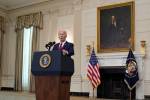A few questions as the president visits Las Vegas
President Obama visits the Las Vegas Valley this morning, his second trip to Southern Nevada in less than three months. And it won’t be long before he comes back again.
It’s critical for the president and his Republican challenger, Mitt Romney, to spend time in the Silver State. Nevada is one of a dozen or so toss-up states that ultimately will decide the Electoral College math in November. Both men need buzz in these presidential battlegrounds, and Rep. Paul Ryan, Mr. Romney’s running mate, last week led a rally in Las Vegas that resembled a rock concert. President Obama’s speech at Canyon Springs High School in North Las Vegas will be at least as loud.
Yes, each ticket desperately needs the votes of Nevadans. However, in courting that support, the president and Mr. Romney will see first-hand the economic devastation that has turned Nevada from the nation’s fastest-growing state into its most desperate. Nevada, with 12 percent unemployment, needs jobs. Mr. Obama and Mr. Romney must see this suffering in person to be reminded of what’s at stake: businesses, livelihoods and the American Dream itself.
In his speech this morning, the president will address education, hardly a defining issue in this campaign. He’ll also talk about the economy and federal spending – problems his policies have failed to improve or significantly worsened over his first term. In this speech, we hope he’ll answer several important questions:
– How does raising income tax rates on upper-income earners create jobs for the middle class?
– How does raising tax rates on capital gains and dividends encourage the investment needed to create jobs?
– To pay down the growing, $16 trillion national debt, Washington must achieve a budget surplus. The current federal budget is projected to have a nearly $1.2 trillion deficit, and the president’s tax plans would raise a little more than $100 billion per year (assuming there was no drop in economic activity). Where would the president cut spending to achieve a budget surplus?
– How do reductions in Medicare reimbursement rates, which discourage physicians from accepting Medicare patients, strengthen the program?
– Medicare and Social Security have promised tens of trillions of dollars worth of benefits that Washington won’t be able to pay. How can these programs be made sustainable?
– How does making energy more expensive help the economy recover?
– What serves college students better: policies that drive tuition prices and student loan debt higher, or policies that increase the likelihood that graduates can find jobs?
– How are Mr. Romney’s previous tax returns relevant to the health of Nevada’s economy?
The answers to these questions would go a long way toward elevating debate and providing voters with the information they need to cast an educated vote.


















